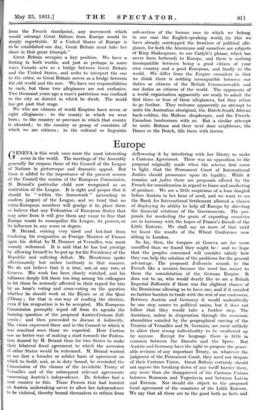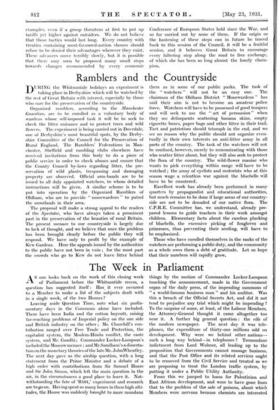Europe
GENEVA is this week once more the most interesting scene in the world. The meetings of the Assembly generally far surpass those of the Council of the League of Nations in picturesque and dramatic appeal. But there is added to the importance of the present session of the Council the session of the European Commission, M. Briand's particular child now recognized as an institution of the League. It is right and proper that it should be " within the framework " (according to modern jargon) of the League, and we trust that no extra-European members will grudge it its place there or believe that any Federation of European States that may arise from it will give them any cause to fear that Europe wants to monopolize the League, its powers, or its influence in any sense or degree.
M. Briand, coming very tired and hot-foot from tendering his resignation as Foreign Minister of France upon his defeat by M. Doumer at Versailles, was most warmly welcomed. It is said that he has lost prestige by allowing hiniself to be put up for the Presidency of the Republic and suffering defeat. Mr. Henderson spoke affectionately but rather tactlessly in that manner. We do not believe that it is true, not, at any rate, at Geneva. His work has been closely watched, and his influence deeply felt there too long among his colleagues to let them be seriously affected in their regard for him by an hour's voting and cross-voting on the question whether he should work at the Elysee or at the Quai d'Orsay ; for that is one way of reading the election, even if his resignation is to be accepted. His European Commission promptly wiped off from its agenda the burning question of the proposed Austro-German Zoll- verein ; and then proceeded to discuss it indirectly. The views expressed there and in the Council to which it was remitted were those we expected. Herr Curtius saw no better way of making a start towards the Federa- tion desired by M. Briand than for two States to make their bilateral fiscal agreement to which the accession of other States would be welcomed. M. Briand wanted to see first a broader or solider basis of agreement on which to build, and, as in duty bound, he reminded the Commission of the clauses of the inviolable Treaty of Versailles and of the subsequent relevant agreements concerning Austria's independence. Dr. Schober had a neat counter to this. Those Powers that had insisted on Austria undertaking never to allow her independence to be violated, thereby bound themselves to refrain from deflowering it by interfering with her liberty to make a Customs Agreement. There was no opposition to the proposal originally made when the scheme first came to light, that the Permanent Court of International Justice should pronounce upon its legality. While it remains sub judice there are proposals offered by the French for consideration in regard to loans and marketing of produce. We are a little suspicious of a loan dangled before Austria in her hour of need, and we want to see the Bank for International Settlement allowed a chance of displaying its ability to help all Europe by directing the financial relations of the Governments. The pro- posals for marketing the grain of exporting countries are in harmony with the hopes of France's friends of the Little Entente. We shall say no more of that until we know the results of the Wheat Conference now sitting in London.
So far, then, the tempers at Geneva are far more unruffled than we feared they might be : and we hope that the peoples concerned will consider calmly how they can help the solution of the problems for the general advantage. The proposed Zollverein sounds to the French like a menace, because the word has meant to them the consolidation of the German Empire. It does not to us, who would dearly like to see a British Imperial Zollverein if there was the slightest chance of the Dominions allowing us to have one, and if it entailed no further barriers to trade with the rest of our customers. Between Austria and Germany it would undoubtedly be one step nearer to political union, but it does not follow that they would take a further step. The Austrians, unless in desperation through the economic absurdities entailed by the geographical carving of the Treaties of Versailles and St. Germain, are most unlikely to allow their strong individuality to be swallowed up by anyone. Except for language there is little in common between the Danube and the Spree. But Austria and Germany have the right to propose the peace- able revision of any important Treaty, so, whatever the judgment of the Permanent Court, they need not despair of their Customs Union. Great Britain certainly should not oppose the breaking down of any tariff barrier there, any more than she disapproved of the Customs Unions between Rumania and Yugoslavia and between Latvia and Estonia. Nor should she object to the proposed fiscal agreement of the countries of the Little Entente. We say that all these are to the good both as facts and examples, even if a group threatens at first to_ put up tariffs yet higher against outsiders. We do not believe that those tactics would last long. Every country, with treaties containing most-favoured-nation clauses should refuse to be denied their advantages wherever they exist. These advances move terribly slowly, but it is possible that there may , soon be proposed many small steps towards changes recommended by every economic Conference of European States held since the War, and so far carried out by none of. them. If the origin or the hastening of these steps can in future be traced back to this session of the Council, it will be a fruitful session, and it behoves Great Britain to encourage every faltering step along the road to free exchange, of which she has been so long almost the lonely cham- pion.







































 Previous page
Previous page